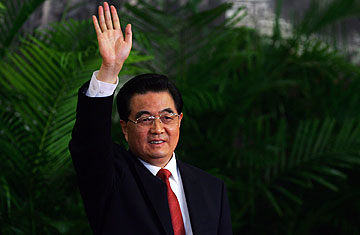
Chinese President Hu Jintao greets the media at the Great Hall of the People in Beijing, Oct. 22, 2007
Who says China's Communist leaders have no sense of humor? When President Hu Jintao introduced the nation's new lineup of top leaders at the grand finale of the 17th National Congress of the Chinese Communist Party, he stuck mostly to the near-robotic demeanor that has become his trademark. But when Hu named the new members of the Standing Committee of the Party's Political Bureau or Politburo, the nine-member body that effectively runs the country, he gave the faintest of smiles as he singled out Xi Jinping and Li Keqiang, the two men universally seen the top candidates to take over his job when he steps down in five years. "At 52 and 54 years old," Hu said in what was the equivalent of a bear hug and kisses on both cheeks elsewhere, "these comrades are relatively young."
Hu could afford to allow himself a touch of levity. Having come into power five years ago under the shadow of his predecessor Jiang Zemin, he had just successfully engineered the departure from the Politburo of of Zeng Qinghong, a Jiang ally who still wielded enormous influence in the party. Hu had also stage-managed the promotion of large numbers of his protégés to senior positions in the party's highest councils. Hu also managed to have his concept of "scientific development" — a catchphrase for implementing a more socially equitable, sustainable and deliberate approach to China's economic growth in coming years — enshrined in the party's constitution. (By comparison, Jiang Zemin only managed to achieve such immortality for his pet philosophical tags upon leaving office.) Hu Jintao's position is "completely consolidated" says Li Datong, former editor of the Chinese weekly Freezing Point and a close observer of Party politics.
To be sure, every top Communist leader since Mao Zedong's personality cult days has wielded less individual power and has been forced to seek consensus approval for important decisions. Hu is no exception and had to make compromises. He failed, for example, to name Li Keqiang, his favored candidate, as sole successor. Indeed, Li stepped out on to the podium Monday after Xi, confirming a belief among analysts that, for the moment at least, Xi has a slight edge in the race to lead China. (If previous practice is followed and no unforeseen events intervene — a very large if' — Xi will succeed Hu at the 18th Party Congress in 2012, while Li will take over as Prime Minister.). Hu also lost the services of the formidable Vice Premier Wu Yi, who fronts China's critical trade negotiations. Wu, 68, was forced to step down because of the same informal retirement age of 68 that was used by Hu and his supporters to rid themselves of several other entrenched rivals.
But as Huang Jing, a senior fellow in Foreign Policy studies at the Washington, D.C.-based Brookings Institution points out, Hu recognized some time ago that he didn't have enough power to name his successor. Instead, he has concentrated on strengthening his authority to ensure that his policies — the ongoing drive against corruption, for example, or efforts to improve mine safety or environmental protection — have some chance of being implemented, rather than simply receiving lip service. The issue is extremely urgent, Huang and other analysts say. China's leaders face a daunting series of challenges including rising inflationary pressure, swelling bubbles in the stock and property markets and highly uneven development that has seen incomes in urban and coastal areas triple or quadruple those in the rural hinterland. Not only must Hu attempt to engineer a soft landing for China's steaming economy and markets, he must also ensure that the myriad problems facing the hundreds of millions of Chinese left on the margins of the boom — lack of access to health care, education and clean drinking water, among other issues — are swiftly addressed. If not, growing social unrest — police say the number of "mass incidents," large demonstrations that often deteriorate into violence, hit a record last year — will rapidly increase. If not addressed soon, those pressures could "blow China apart," Huang says.
But while Hu is likely to achieve backing from Party members in his efforts on the macroeconomic front, a much greater question mark hangs over his ability to see those policy changes accepted on local levels, where officials see continued economic growth as a direct route to personal wealth. "If there's a conflict between the provinces and the center over these policies" says Li Datong, "it's not because of a dispute over the policies, it's because there's a dispute over who benefits. When the people who have benefited have to lose power, then it's very hard to predict what will happen." Given such challenges, it's probably just as well Hu managed to inject a brief moment of humor Monday. He may not have much to laugh about in coming years.
